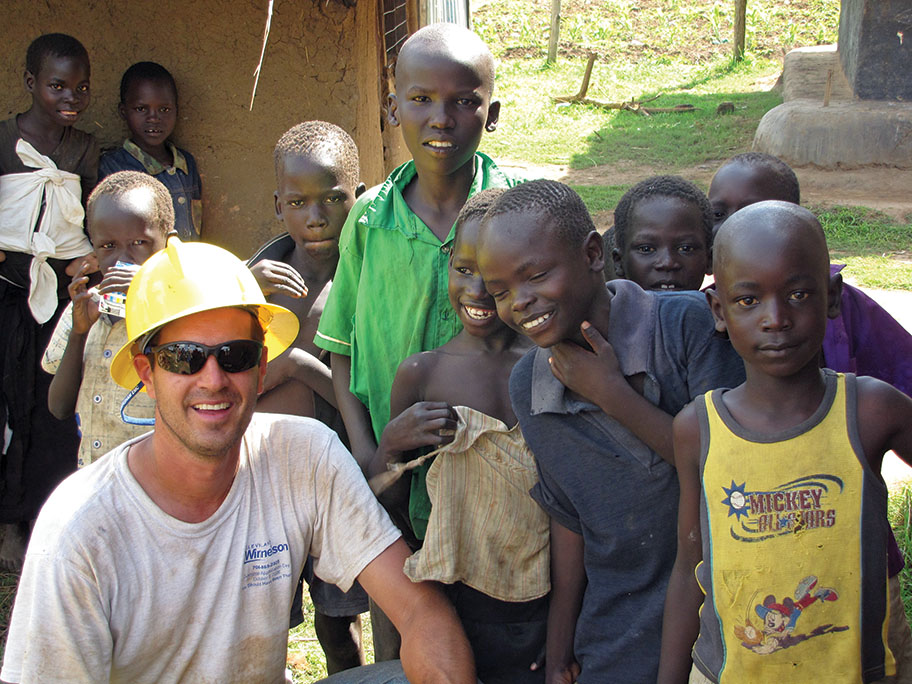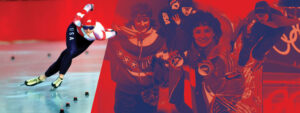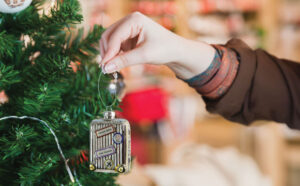A sunbeam illuminates an elderly woman’s snow-white hair. Sound asleep in her wheelchair, her tiny frame lists to one side. A cheerful nurse in brightly colored scrubs leans over and whispers in her ear, “Guess who’s here?” The 107-year-old woman’s eyes fly open, bright with anticipation, and she sits up in her chair. The clip-clop of tiny hooves grows louder, signaling the arrival of three miniature horses from Heartland Mini Hoofs, a mini equine visiting program.
One of the horses is ushered to her, and she is transfixed. Patting the horse’s face and running her fingers across his smooth hair, she chatters excitedly. She drinks up every minute of the experience. But, when the horse leaves, the woman retreats back into her thoughts where she’ll be until the next visit from her tiny-hooved friend. The woman never speaks to any of the nursing home staff, but when the horse visits, something stirs deep inside her, and she feels a connection to him.
This type of scenario has played out for Andra Ebert many times. She and her family run Heartland Mini Hoofs, a not-for-profit entity that provides therapeutic visits to hospitals, rehab facilities and schools. She’ll go anywhere people can be transformed by the joy and connections the tiny horses generate.
Ebert, a teacher, licensed social worker and registered nurse with a master’s degree in gerontology, uses all she’s learned to develop a meaningful visiting program designed to reach into the hearts and minds of those served by the program. Ebert says, “That’s the beauty of these guys. They open doors to conversation between the residents, and residents and their families. For some people it’s a memory that it brings back, and for some it’s just the uniqueness of it. It’s a special part of a day. People who don’t normally come out of their rooms will come out to see these guys.”
Although the Eberts’ daughter Morgan has two standard-size horses that live on their farm in rural Stonington, bringing miniature horses into the fold had never been considered until Andra saw a newspaper article about the benefits of therapy through horses. It took a couple of visits with Kate Bashor at Legacies of Hope Initiative in Kansas City and witnessing the impact the horses had on nursing home residents during a few facility visits, and she was hooked.
A few weeks later, two miniature horses, Jasper, who is a deep rust color, and Bailey, a pinto, became permanent members of the Ebert family. Four-month-old Winnie, a buckskin with dark socks, followed soon after. While Winnie and Bailey are registered thoroughbreds, Jasper is more of a hybrid variety, and according to Andra, the orneriest of the bunch.

The Ebert’s horses have only been going on visits for the past 17 months. Every visit is special in its own way, but some really stand out in Andra’s mind, such as Winnie’s first visit to a nursing home. At Primrose Senior Care Facilities in Decatur, Clayton Mees fell in love with Winnie. In fact, as he petted her, she fell asleep with her head in his lap. “I could tell just by the way he handled her that he knew horses,” said Andra. “I asked what kind of horses he’d owned. He says, ‘POAs (Ponies of America), and I miss them.’”
The story could have ended happily then, but Andra had a golden opportunity to make a good thing even more meaningful. Shortly after the Primrose visit, she received a call from Mees’ daughter, Janeen Mees Daftary, who said, “This may sound weird but your horse was with my dad in Decatur and fell asleep on him.” Andra immediately knew she was referring to Mees. Janeen explained that his 90th birthday would be on March 26, and the one present he really wanted was to see Winnie again.
Andra also recalls visiting Matthew’s Kids in Springfield where kids who are predominantly homeless can safely gather after school and do homework. “When we were done with our presentation to them, the students were petting the horses, and a group of 6-10 girls gathered around and asked if they could braid Bailey’s hair, and I said ‘yes.’ They surrounded her on all sides and started braiding her tail and her mane, and by the time we left her hair was a mess. It took about a half hour when we got home to brush it out.” She adds, “These kids had a ball, and that’s the kind of thing you can’t put a price on. Most of them had never been around a horse before. The big ones can be scary, but our small horses are more manageable
for people.”
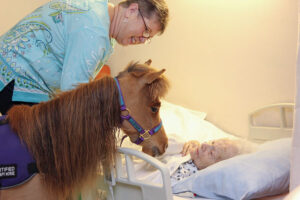
The mini horses have been to many nursing homes. On a recent visit to Pleasant Hill Village in Girard, the horses were all introduced to 100-year-old resident Dorothy Spence. She kissed the horses, and even sang to them. It truly brightened her day.
“Pet therapy is so important. It helps with sensory response; the smell of the animal, the feel of their soft fur, and the sound of their hooves clicking on the tile floor. It gives them happiness, brings back memories, puts smiles on their faces, and nurtures love and warmth,” says Ann Johnston, Community Relations Director at Pleasant Hill Village. Johnston adds that therapy animals can also improve resident behavior. She explains, “When they hug an animal, their mood is much better, and they’re happier.”
Mini horse visits are also popular at schools. Andra doesn’t feel they should just take the horses for a play date at a school, but use the opportunity as an educational tool. She says, “Horses’ teeth are so gross. I always show kids their teeth and say, ‘this is what’s going to happen if you don’t brush your teeth twice every day, and they’re like, ‘ewwwwwww!’”
And school visits are about to become more interesting. Andra and Morgan recently self-published a 24-page book, called Winnie the Mini, detailing Winnie’s first day at the farm and how she learned to become a therapy horse. This children’s book is for ages Pre-K to eight, and is now available to accompany Winnie to schools. Winnie will even be able to “autograph” the books. Her hoof will be placed on a special pad and pressed on a page, leaving a bona fide horse signature.
Although some people may refer to these animals as “ponies,” the appropriate term is “miniature horse,” and according to the American Miniature Horse Association, they can stand no taller than 34 inches. But don’t let their small size fool you. From the 1800s to the 1930s, these tiny powerhouses worked in the coalmines, pulling carts of coal to the mine surface. After the 1930s, miniature horses were replaced in the mines with mechanized machinery, and interest in them waned. In the 1960s and ‘70s, their popularity resurged with hobby farmers, and as pets.
Taking horses out for visits would be fun, right? Well, yes, but according to Andra, it’s also a lot of work. “I’m sure it sounds ridiculous, but for a one-hour visit, it takes the whole day,” she explains. “With the guys’ help, we get them ready, clean them up and groom them. You drive them (the horses) there, then you get them out and brush them again. We put on their vests and poop bags and clean their feet with a hydrogen peroxide mix.” More work follows once the horses return home.
Heartland Mini Hoofs has only been in operation since 2014. In 2015, their first full year of operation, they conducted more than 110 visits, and put more than 8,000 miles on Andra’s vehicle. And although it costs less to feed a horse than a dog, boarding and transportation costs are another consideration. To avoid paying boarding fees, Andra’s husband Bill and son Brendan care for the horses during the week. On weekends, they, and a small team of volunteers, rotate duties with her. Andra is retired, and the program relies on the volunteer workers and donations, so raising money is a fundamental necessity to keep the program running.
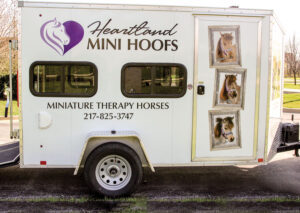
When they needed a trailer to transport the horses, the Eberts staged a “Wheels for Winnie” fundraiser at the Walmart store in Taylorville. Stationed at the store entrance, Winnie and Bailey became unofficial Walmart greeters. They raised about $1,000 in donations in three hours and entertained the shoppers. Andra was amazed by the impact the horses had on both the girls and the boys who had plenty of questions, especially the teenagers. She says, “They’re all about the selfies, and took plenty with the horses.”
Andra sits on the newly created American Miniature Therapy Horse Association (AMTHA) board of directors. The association has grown out of PetPartners, which focuses on dogs as service dogs. “We felt that in order to really truly make sure horses were represented, we needed an association that is based out of horses. Dog heads and horse heads are totally different. They have different mindsets,” says Andra.
On most Sundays, the board, whose members hail from across the country, chat on Facebook, or communicate via email to set policy. The ANTHA board is planning a “meet and greet” this summer near Branson, Mo., where members will bring their horses and meet face-to-face for the first time.
The American Disability Act truly only lists dogs as service animals. “These guys (the horses) can be listed as service animals. The only difference is that they can’t sit their behinds down. It displaces their hips. They can do anything a dog can do. They can open doors, and they can do lights.” But while dogs might only have 10-12 years as a service animal, a miniature horse could have a 30-year career. They can be potty-trained and are the perfect size for a child who has a condition such as cystic fibrosis and has balance issues. They will stand perfectly still at a school desk until their services are needed.
The excitement generated and joy brought to the many people who have met the miniature horses during visits through Heartland Mini Hoofs are proof of the program’s worth. Despite all the time and effort required to run the program, Andra says she wouldn’t change a thing. She explains, “This is our ministry. I never believed it would be as big as it is, and that it would take as much time as it does on our part.”
For Andra it’s simply a labor of love, and that’s the “mane” thing.
For more information about bringing Heartland Mini Hoofs in to delight your patients, residents or students, contact Andra Ebert via email at barnmom50@gmail.com, or by phone at 217-825-3747, or you can follow the organization’s activities on Facebook at: https://www.facebook.com/HeartlandMiniHoofs/


